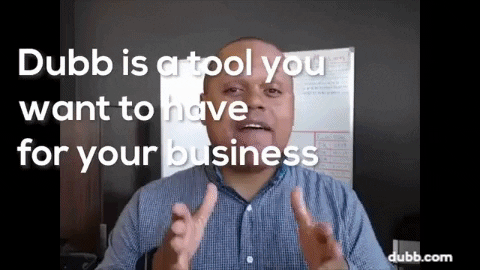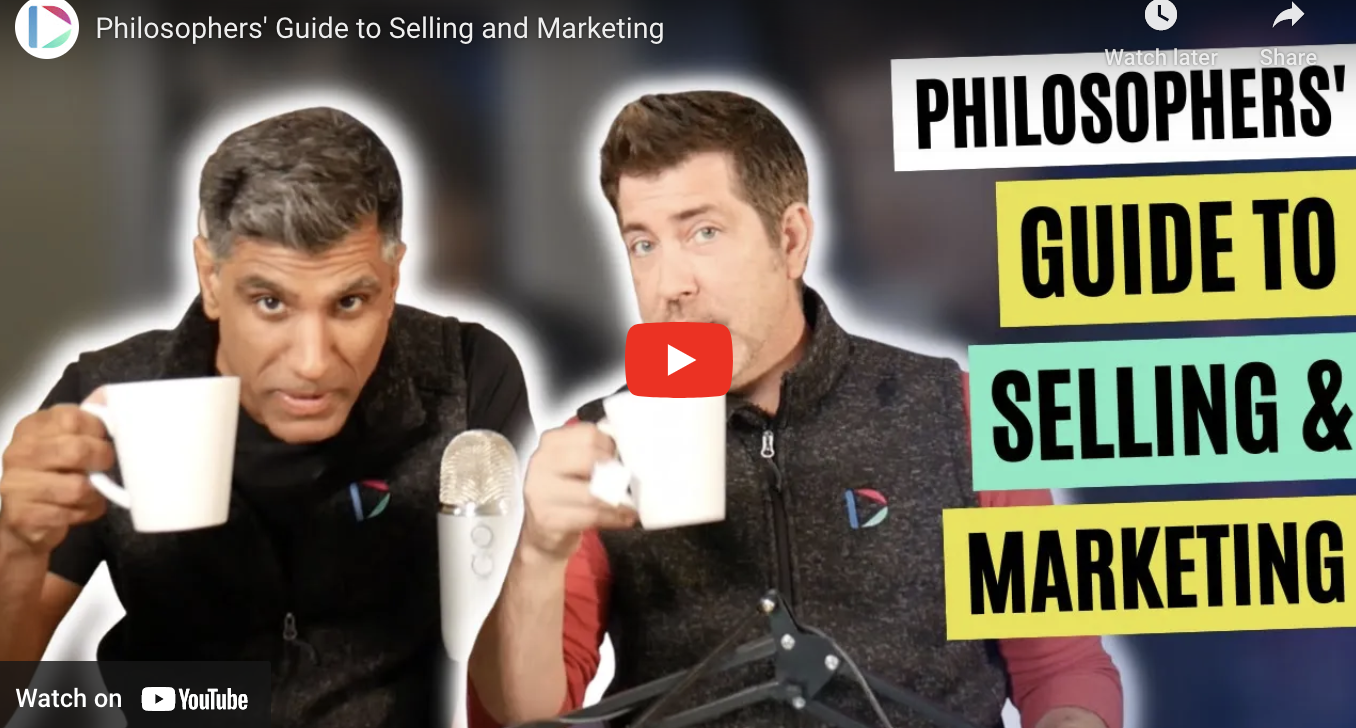In this recap of a recent episode of RevShow, Rob and I spoke about seven philosophies that can help you change the way that you sell and market. Whether you are the solo founder of a startup or are a sales or marketing leader in a much larger organization, you can use these tips and strategies to reach your goals. If you would like to view this RevShow episode in its entirety, go ahead and click on the video above.

Philosophy is something that we don’t often think about in our daily lives. All of our lives are extremely busy, whether we are taking care of work tasks or dropping our kids off at after-school activities. It can be difficult (even seemingly impossible) to think about large philosophical questions or issues while we have pressing deadlines on an all too long to-do list.
While the sales and marketing world isn’t normally full of philosophers, I want to use this post to take a step back and get philosophical with you. The great news is that by taking this step back and adopting several philosophies, you can actually get much closer to your sales and marketing goals—whatever they are.
In this post, you will be taken on a deep dive into the philosophical world. What we are going to do is go to the East, West, and everywhere in between. We are going to spot different philosophies that you can not only learn about, but that you can apply to become a better sales or marketing leader. Understanding these philosophies, you can better close sales, create stronger relationships, and drive more revenue for your company.
The Socratic Method
I want to start this discussion about these philosophies by talking about the Socratic Method. As you can guess, Socrates, the famous Greek philosopher, created the Socratic Method. Most of us have heard of the Socratic Method. At its essence, this is one of the philosophies that are all about getting to yes.
As stated by Google Arts and Culture, “The Socratic method is a form of a cooperative argumentative dialogue between individuals, based on asking and answering questions to stimulate critical thinking and to draw out ideas and underlying presuppositions.” The biggest part of that definition is underlying presuppositions. What you are trying to do is challenge those underlying presuppositions so that you can get closer to fundamental truths.
Here is a quick example of the Socratic Method in practice. My goal is to get Rob to say yes to every question that I am asking. For instance, I could ask Rob whether he likes chocolate, coffee, trying new things, and whether he wants to try a mochaccino at Starbucks. Let’s assume he says yes to all of those questions. However, when I ask him whether he wants to buy me a cup of coffee at Starbucks, he may say no. When he says no, the exercise ends.
This is the easiest way to explain what the Socratic Method is all about. The Socratic Method is one of those philosophies that isn’t about being manipulative. It isn’t trying to take advantage of another person. It is really just trying to find a confirmation of a certain premise or fact. In other words, it is about getting the yes ball rolling. Basically, it is a rolling snowball of yeses that you are getting from another person. When you have a snowball rolling, good luck stopping that snowball.
And to be clear, this is a good snowball for both sides of the conversation. You are educating another person through this method. By getting yeses, you are likely saying things that they want to hear. Eventually, they will probably be thinking, “Wow, you are actually showing me the light on this. I want to learn more.” If you get enough yeses, you may actually convince that other person to purchase your product or service.
Remember that confirmation here equals affirmation. By engaging in the Socratic Method, you are helping the other person discover something that they already know. They may already know that truth on a subconscious level, yet you are presenting it back to them. For instance, if you are selling advertising agency services, you may drive the prospect to keep saying, “Yes, yes, I want to get more warm leads. I want to get more conversions. I want to make my advertising and marketing more scalable.” This sort of exercise goes a long way in helping you strengthen your relationship with the other person and understand what it is that they are truly looking for.
As a solutions provider, you can get a prospect or customer to confirm all of the struggles that they have. Once you do that, you can go one step further and have them affirm that you are the right person that can help them address their struggles. This is the Socratic Method as applied to sales and it is something that you will want to keep in mind. Applied in this way, the Socratic Method can help you generate more sales and truly solve problems that your prospects and customers face in their lives.
Whether you just met a prospect or are interacting with a decades-long customer, don’t hesitate to use this strategy in your day-to-day sales work. Your future self will thank you.
Stoicism
From the Socratic Method, let’s talk about Stoicism. Specifically, I am going to talk about the Stoic method of selling, which is one of those philosophies that can be extremely accretive to your business.
If you haven’t yet heard of Stoicism, it is helpful to look at a quick definition. Essentially, you can think of Stoicism as the enduring of pleasure or pain without showing emotions when you need to react (like when you are getting badly burnt). As part of this same definition, Stoics won’t react when they win the lottery. The general idea is that Stoics take a neutral view of both the good and bad in life.
But let’s take one step back here. I choose not to believe in this definition of Stoicism. I have sort of created my own definition of it because I still want to be a human being.
Here is my take on Stoicism: it is all about being disciplined within yourself. It is about being an observer of things, rather than being a reactor to things. It is about living within virtue. I also think that one of the more important things about Stoicism is about being empathetic with people that are not Stoic or disciplined. Stoics can relate to those who don’t have structure in their lives. Basically, the idea here is that you can be a human and an observer at the same time. You don’t need to overreact and get completely subsumed by your emotions. Instead, you can take a step back and act in the way you actually want to act.
So let’s think about this in the sales process. One of the biggest things you always hear about in sales is the power of listening. If you really think about it, listening is a form of observing. When you take this to heart and make listening one of the cornerstones of your sales interactions, you will then be present, mindful, and have a much better outcome. On the other hand, if you don’t prioritize listening in your sales conversations, you are going to find it really difficult to make a genuine connection. And if you can’t make that genuine connection? It is going to be nearly impossible to make that sale.
This is just a high overview of Stoicism. If any of this interests you, I recommend that you search for Marcus Aurelius, Cato, and Epictetus. There are some great quotes out there (one of my favorites is, “It is hard to be disciplined. It’s even harder to be empathetic of people that are not disciplined”). Ultimately, this emphasis on empathy and listening is a hugely important part of Stoicism and of generating sales. Don’t hesitate to rely on both of these skills as you’re completing your work.
Taoism
Now, let’s talk about Taoism. This is one of my favorite philosophies and it has to do with “the way.” Taoism is a Chinese philosophy based on the writings of Lao Tzu (6th century BC) that advocates humility and religious piety. We have heard about “the way” in many different contexts. In Star Wars, for instance, we hear the phrase “May the Force be with you.” Essentially, you can think of “the way” as the order and path of all things. These are things that exist when it comes to humanity, nature, and the overall cosmos.
There are some fascinating principles from Taoism that most of us already know. In fact, there is one that you have probably seen on a tattoo. That is the yin and the yang (in other words, the balance of things). So when you go into a sales situation, you need to realize the landscape. That landscape is always filled with balance. It includes the up and down, the good and the bad, and the light and the dark. Once you recognize this landscape in every sales interaction, you can navigate the sales interaction in an intelligent way.
What is really fascinating about this is that without darkness, there wouldn’t be light. If you think about the balance of things, you need to understand that not everything in your sales and marketing work is going to be hunky-dory. You are going to have peaks and valleys. Challenging times are inevitable. There will be times when things are not going well. However, without recessions or challenges, there wouldn’t be periods of hypergrowth. In the Dao, all things are effectively balanced. And if they aren’t balanced? You need to seek balance.
The second important idea in this discussion of Taoism and sales is being adaptable. As Bruce Lee says, “Be like water”. This means that if water is in a pot, it becomes a pot. If water is in a cup, it becomes the cup. Water can flow and crash. It adapts tox the circumstances that it is facing. Like water, we can adapt to our surroundings. As just one example, if you are creating sales videos for your prospects and see that your prospects are dropping off at a certain point, you will need to adapt your style and change things up. You may need to alter your pitch or spend more time discussing the value of your product or service. Whatever the case may be, being adaptable is a core trait for all sales professionals and marketers.
Finally, let’s go back to “the way.” Ask yourself: what is the sales “way”? The sales way is that you must present something to someone. You must lead with value and eventually ask a buying question. No matter what it is that you are selling, this combination of value and buying questions can help you reach your goals. Not only do you get to build a strong relationship with your prospect or customer, but you put yourself in a nice position to make a sale. In the end, follow the “way” as you are interacting with any type of prospect.
Psychoanalysis
Now, we are going to get somewhat psychoanalytical and talk about the psychoanalysis theory of selling. Psychoanalysis was inspired by the father of psychoanalysis Dr. Sigmund Freud. Of course, this is one of those philosophies that can change the way you sell and market to your prospects and customers.
The simplest way to define this is by looking at the three different parts of psychoanalysis. You have the id, ego, and superego. On a grand scale, the id is all about your instincts. The ego is about reality. And the superego is about morality.
I want to dig into these three concepts a bit more. Let’s start with the id. I think the id is our primordial instinct that if it feels good, do it. In the sales context, this basically means that you don’t care who the person is and what problem (or problems) they are trying to solve. All you want to do is get the money so that you can go buy a toy. As you can guess, this is a very shallow approach to sales. It is a burn and churn tactic that can lead to some sales, but comes at the cost of broken (or permanently damaged) relationships.
With ego, you are taking a me-centric approach. It is a little more articulate, but it basically means that you have these goals and that you want to accomplish them. To do that, you will create something that helps you get closer to those goals.
Finally, with the superego, it is about morality. You want to move toward the moral high ground of accomplishing a task. So in the sales pipeline, conversations, and analysis component of this discussion, the superego is an overarching umbrella. It is essentially saying, “Okay, let’s make sure that what we’re doing throughout the sales process is helping the prospect achieve his or her goals. We aren’t just looking at our commissions or bettering our bottom lines. It is about improving that prospect’s life and making a difference with the value that we are offering.” Really, the superego is about creating a strategy so that you can attain certain things. Those things are improving your prospects’ lives. The bonus is that you get to generate sales for your organization.
The takeaway with psychoanalysis is this: understand that a big part of who we are as humans is our ego. That drives our inner desire to attain and do things that make us feel good. To transcend this approach, I think that much of it comes down to mindfulness. Mindfulness helps us understand that our work isn’t about fulfilling our egos. Being a successful sales leader will never be rooted in how you can attain and achieve something to serve your ego. It is always going to be about helping others. If you think about it, it comes back to the definition of power. Power involves the removal of obstacles, but the only way to attain power is to remove obstacles for others.
As far as psychoanalysis, I’ll leave you with this. It’s not about the good; it is about the greater good. Keep the greater good in mind as you are completing your sales and marketing work. It will both make you happier and will help you get much closer to your objectives.
Nihilism
Now, I want to talk about everyone’s favorite philosophical method: nihilism. You are probably already familiar with nihilism, but let’s spend some time with the definition. Simply put, nihilism is the rejection of all religious and moral principles and the belief that life is meaningless.
To me, nihilism is one of those philosophies that is so funny because it is ultimately rooted in skepticism. Further, it is rooted in the belief that there is no belief system. In other words, it is the idea that life has no meaning. Clearly, it is a very pessimistic and negative look at life. At the same time, there are plenty of nihilists out there who adopt this attitude. Clearly, it means something to them—even if it is too pessimistic or negative.
With all of that said, there is actually a way to get liberated from nihilism. What’s interesting is that if you try to create your own order, meaning, and value system, you can rise up beyond uncertainty. As you have probably heard, there is this idea that rising tides lift all boats. If we adopt the idea of helping others as constituting the meaning of life, we can overcome skepticism about larger questions (like why we are here).
There is another big takeaway here. One of the hallmarks of nihilism is the impulse to destroy. In the sales context, destroying can be going all-out for that close. It can be reading that script or not listening to the other person. It can be all about having only your goal in mind, which is getting the quickest close possible and adding to your sales count for the month. That is basically the definition of destruction. Here, you are destroying a sales relationship that can be extremely fulfilling and profitable in the long run.
So when thinking about this in the context of sales, you need to reverse this idea. You aren’t closing a relationship; rather, you are opening a relationship. That means that you take the time and invest in that burgeoning relationship. You listen to the prospect, pause, think, and react. By doing this, you are breathing life into the sales process, rather than choking it out and destroying it. I think this is a way that you can take some positivity from nihilism and thereby help you create great relationships with your prospects and clients.

Absurdism
The sixth of seven philosophies that I want to discuss is absurdism. The definition of absurdism is “a philosophy that refers to the fundamental nature of conflict in the human tendency to find meaning and inherent value in life and inability in the same in a purposeless existence in an irrational universe.”
What is interesting about absurdism is that everything is irrational and meaningless. Further, the very search for order will ultimately bring us conflict. The reason why this applies to sales is this: how many salespeople do you know that constantly search for “the method”? How many are searching for “the process” or “the technique” that will help them reach their goals? They are constantly spending money, hiring sales coaches, reading books, and constantly going through this evolution of trying to find that secret silver bullet.
Instead of doing that, these sales professionals should be looking inside themselves. The answers are there and they involve authenticity and virtue. Instead of getting lost in the woods and searching around for “the answer” that can help you achieve your sales and marketing goals, you can sit at home and look inward. You don’t want to mimic others through a sales system that you may have paid for. That is an easy way to get lost in the universe of chaos and meaninglessness. By contrast, when you find authenticity and virtue, you find meaning (which is diametrically opposed to the absurd). Keep this in mind as you are perfecting your craft, communicating with your clients, and working to create as much value as possible.
Existentialism
Finally, let’s talk about existentialism. Existentialism is a philosophical theory or approach which emphasizes the existence of the individual person as a free and responsible agent determining their own development through acts of the will.
When it comes to sales, I really connect with this school of thought. I feel this way because existentialism is about our will and how we actually create our destiny and output. I think that so many people in sales can relate to this because sales professionals, generally speaking, are self-starters. They are self-motivated and they have a goal-attaining personality type. Yes, they are ambitious about their own goals, but they also recognize that they are here to improve others’ lives through their companies’ products and services.
Now, it is important to recognize that our actions can determine our outcomes in sales. But to do so, you need to ensure you are using the correct conduit (which is yourself). The existence in existentialism is all rooted in your actions, so keep this in mind as you are adopting this philosophy to your sales and marketing repertoire. You have the power to create massive, positive change in the world. Make sure that you are using that power wisely and ethically.
Applying These Philosophies to Your Sales and Marketing Work
These seven philosophies can play a huge role in helping you achieve your sales and marketing goals. The great thing here is that you don’t need to incorporate every single one of these philosophies into your day-to-day sales work. You can instead think about experimenting with the Socratic Method on one day and Taoism the next day. Whichever you choose, take some positive step forward and see what happens. The results from these philosophies may surprise you.
At Dubb, we are always thinking about topics like these seven philosophies that can help you change the way you sell and market. If you have any questions about this post or anything else about Dubb, you can click here to contact us. You can also click here to learn more about Dubb and click here to get a free 14-day trial of our premium plans.


